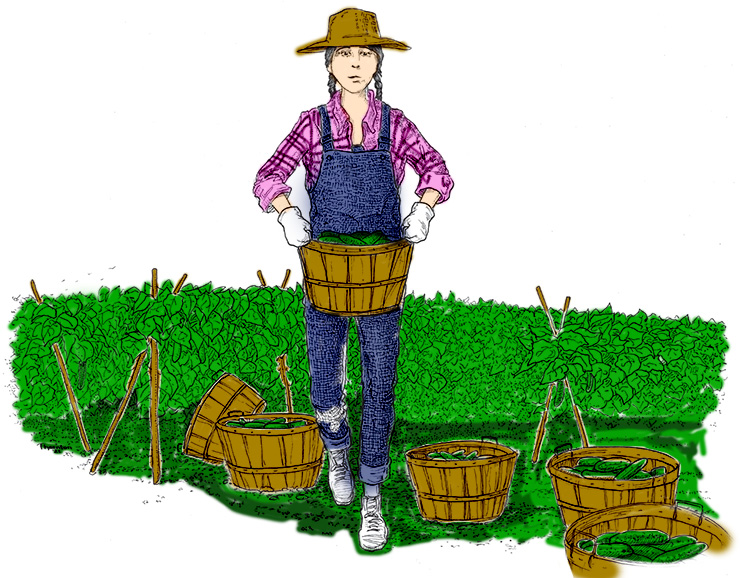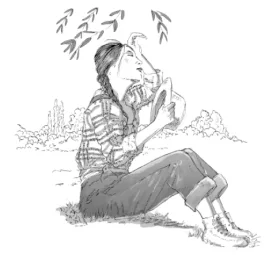
Almost 40 years ago, I went to school for horticulture, a two-year, hands-on program at the University of New Hampshire. During the Summer between those two years, we had to get a job in our chosen specialty. When we returned to school in the Fall, we were to submit a 5-page paper on “what we learned.”
Even though I wanted to be a landscaper, I ended up on a 350-acre vegetable farm. I have never regretted it.
Let me back up for a moment. Two years prior, I had landed a job on the greenhouse crew of a large Summer resort. Beginning in April, three other 20-something women and I started from seed all the annuals for the dozens of flower beds that colorfully decorated the grounds. We made seeding trays out of wood, mixed our own potting soil, sowed hundreds of pounds of seed, and tended the seedlings as they grew in the safety of the greenhouse.
When the seedlings were ready and frost had passed, we spent weeks tucking them into beds for the season. We gently hand-watered them in and gave them a 6” blanket of bark mulch.
Throughout the heat and humidity of Summer, we watered, fertilized, weeded, deadheaded, and kept an eye out for insects and disease. When frost came, all my coworkers left to find Winter work. My supervisor and I were the only ones doing Fall clean-up. Then in October, she hurt her leg so badly that she was unable to work for the rest of the year. I became the cleanup crew.
I raked up the mulch and pulled the hundreds of frost-killed annuals from the beds we had so carefully placed them in six months before. When that was done, I spent days and weeks hauling rotted manure with a Kubota tractor, dumping it on each bed for nutrients and Winter protection.
I washed, disinfected, and stacked the planter boxes. I scrubbed, bleached, and hung up the hand tools. When the work was done, the day before Thanksgiving, I locked the greenhouse door one last time and set out to find a job for Winter.
With that past experience, I felt like I could handle a Summer job working on a large vegetable farm. But suddenly I was planting hundreds of tomatoes and peppers by hand in what seemed like miles of black plastic row cover. I thought my former job was a lot of work—but now I was planting, fertilizing, weeding, and harvesting from 7 a.m. to 5 p.m., six days a week!
As the weeks rolled by, I was constantly looking for a topic for my school paper. “What am I learning?” I asked myself repeatedly. But while the work was hard, it was also familiar. I wasn’t learning anything new. What could I possibly write about?
In midsummer, my daily morning job became harvesting two-and-a-half acres of cucumbers. I was instructed to pick every other row one day and pick the other rows the next day. Repeat: day after day, week after week.
The field was huge—it took several minutes just to walk across it. All I could see was an endless ocean of lush, green cucumber vines. Row upon row upon row. Long row upon row.
The first day, I panicked as soon as I got out of my truck. “I can’t pick all those cucumbers in five hours,” I cried aloud. “I don’t think it’s possible!”
I was overwhelmed. I was afraid to start, because I was afraid I wouldn’t finish. But this was my job! It had to get done.
“Just start,” I told myself.
Morning after morning, I pulled up to the field with dozens of bushel baskets, and the panic would return. I’d start working, and part way through, I’d want to give up. I was terrified I couldn’t finish it. I had to figure out a way to not let my fears overtake me. I didn’t want to fail.
After the first week, I realized that when I looked at or thought about the size of the field, I’d worry. So I decided to focus only on the plants I was harvesting and not look up.
When I walked back to the road with a full basket of fresh cucumbers, I kept my eyes forward or on the ground. I never looked to see how many rows I had harvested or how many were left.
Nor did I look at the clock in the truck. I was afraid I’d find out I was behind. Instead, I’d glance at the sun for an approximation of time—and keep working.
To my amazement and relief, every day I finished the harvest on time. I succeeded! Daily! Every day at 7 a.m. I panicked, but every day at noon, I had gotten it done.
One hot, steamy August morning, as my glasses slid down my sweaty nose somewhere in that huge cucumber field, I knew what I would write about for my school paper. It was not about planting, weeding, fertilizing, or harvesting.
It was about me.
I’d learned how to persevere.
Back at school in September, I wrote five pages on my fears and how I’d overcome them. I wrote about how a job gets finished by starting it—and sticking with it until it was done. I talked about how I’d learned to pace myself, to stay focused and present to keep from becoming overwhelmed. I’d learned how to take control of my emotions and tackle obstacles.
I’d learned how to succeed.
In hindsight, I’d probably drawn on my experience working on the Greenhouse Crew—long days, long season, working alone, seeing it through to the end. At the time, though, I did not connect the two.
I learned perseverance in that expanse of cucumber vines. And perseverance has gotten me through decades of growing seasons, jobs, schooling, relationships, traveling, moving, and single parenting.
The most rewarding part of this lesson is not about me, though. It’s been about passing on the knowledge I gained.
Recently, I worked with a 23-year-old intern on a small vegetable farm. One busy Summer morning, she was bored with bagging up 200 heads of lettuce for market shares and restaurant orders. She whined and asked for a different job, but this was the most pressing one. We had a delivery schedule to make.

When I saw she couldn’t manage her own restlessness, I told her my story of the cucumber field and how I taught myself, at her age, to get through what seemed like an endless task. She listened intently, then got calm and quiet, and filled bag after bag of lettuce until it was done. I hope she learned that being a farm worker meant learning how to stick it out through mundane tasks. And I truly hope that information will serve her the rest of her life.
I know it will me. ❖



